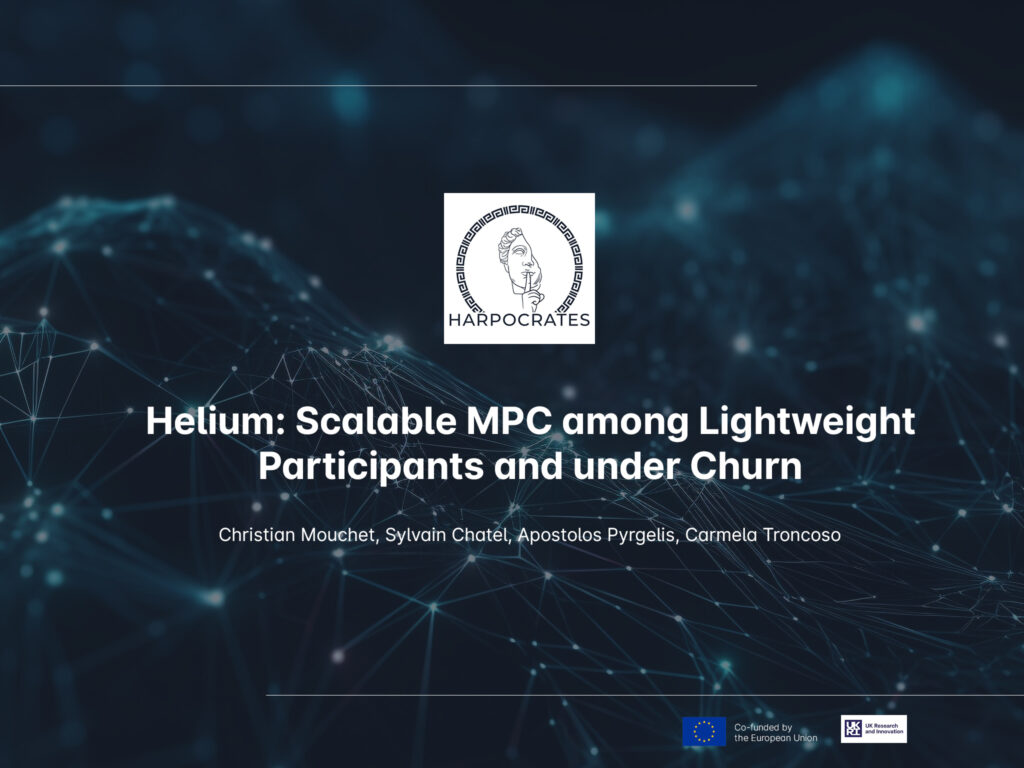
Secure multiparty computation (MPC) plays a key role in enabling privacy-preserving collaborations across various domains, including healthcare, finance, and machine learning. However, existing MPC frameworks often require significant computational resources and stable network connections, making them impractical for many real-world scenarios.
A recent publication, Helium: Scalable MPC among Lightweight Participants and under Churn, by Christian Mouchet (Hasso-Plattner-Institute, University of Potsdam), Sylvain Chatel (CISPA Helmholtz Center for Information Security), Apostolos Pyrgelis (RISE Research Institutes of Sweden), and Carmela Troncoso (SPRING Lab, EPFL), addresses this challenge by introducing a new framework that enables scalable MPC even for resource-constrained participants and in environments with high network churn. Helium leverages multiparty homomorphic encryption (MHE) as its core building block, providing robust security guarantees while reducing the computational and communication overhead typically associated with MPC.
Key Contributions
-
MPC for Lightweight Participants: Helium is designed to support parties running on low-end devices with limited RAM and computational power, making secure computation accessible even in constrained environments.
-
Handling Network Churn: Unlike traditional MPC frameworks that require all participants to remain online, Helium ensures that computations can progress even when participants frequently disconnect and reconnect.
-
Efficient Execution: The framework introduces a novel execution mechanism that reduces the overhead of MHE-based MPC, allowing efficient operations even with a large number of participants.
-
Open-Source Implementation: Helium is the first publicly available implementation of an MHE-based MPC framework, providing a foundation for future research and real-world applications.
Performance Highlights
The study demonstrates that Helium achieves significant efficiency gains compared to existing MPC solutions. In an experimental setup with 30 participants and a churn rate of 40 failures per minute, Helium was able to compute a matrix-vector multiplication operation 8.3 times per second—approximately 1500 times faster than state-of-the-art MPC frameworks under similar conditions.
Relevance to HARPOCRATES
Privacy-preserving computation is a critical component of the HARPOCRATES project. Research on secure computation techniques, including Helium’s approach to scalable MPC, contributes to advancing the state of the art in privacy-enhancing technologies. The ability to perform secure computations efficiently, even with unreliable connections and lightweight devices, is particularly relevant for federated learning and secure data sharing applications.
The full paper is available at Zenodo.
Recent Posts
- Privacy-Preserving AI and Data Analysis – HARPOCRATES Technical Brief Paper
- National Seminar Horizon HARPOCRATES — Responsible AI: Risks, Uses and Limits
- Project video: Unlocking Smarter, Safer AI with HARPOCRATES
- Privacy-Preserving Machine Learning for Health and Security
- Recordings and Presentations from the AI & Security Webinar Now Available
